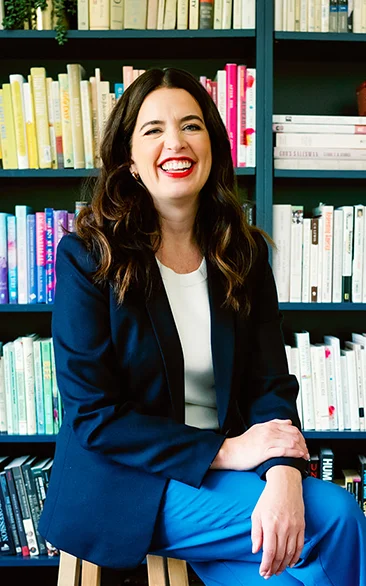Kate Bowler: I’m Kate Bowler, and this is Everything Happens. I’m a historian, author, aggressively, fast walker. But lately, in a world that promises endless progress, even now in a pandemic, I realized I just need to be a person. It’s hard to give up on the feeling that the life you want is just out of reach. If only you tried to eat this food, find that relationship, just get the kids graduated or the parents this kind of care. Only then will I feel different. Better. Whole. But that’s not the way this works. When I was 35, I was diagnosed with stage four cancer. And here’s the very fun thing about that. The world loves you better when you are shiny, when you are cheerful, when you still believe that your best life now is right around the corner. I’ve written multiple books on the history of the idea that you can always fix your life. So I’m going to be the one to say it. There are some things we can change and some things we can’t. And it’s OK that life isn’t always getting better. We can have beauty and meaning, community and love, and we will need each other if we’re going to tell the truth. Life is a chronic condition and there’s no cure for being human.
Kate: Our culture says that everything has to be for something, reading is for self-improvement, hobbies are for enrichment. Didn’t you know your child’s soccer practice is a long haul attempt to better a college application? Your crappy watercolor painting has to hang in the living room or else that afternoon was a total waste. Didn’t you know you’re supposed to be getting better all the time? It’s called Hyper- Instrumentalization, the obsession with use, and it’s a symptom of the pragmatism that has wound its way into almost every part of American culture. How useful was your day? When our lives get overwhelming, it’s tempting to begin to use this logic as a weapon against ourselves. Look at us failing to multitask. We didn’t get up early enough. We didn’t check enough things off our To-Do list. We failed to render all goods into ideas and practices and moments that can be useful. We failed. I’d like to tell you that I’m the kind of person who can say with a straight face, just do nothing. Take long, luxurious bubble baths, a magic face mask can fix everything, just eat right and drink enough water or get enough steps in. But the self-help and wellness industry might be lying to us. Some things can’t be fixed, or at least not that easily. Even on our worst days, life continues. The kids need to be fed, bills need to be paid. Our bosses need projects finished. Our caregiving responsibilities can’t be put on pause. It might seem counterintuitive, then, that when life is at its worst, I can’t turn to doing nothing. When a week is full of hospital appointments or when I can’t seem to get out of an anxious thought loop, I need to do something for no reason at all. When the stakes are low, it just feels so good to try. Today I wanted to talk to someone else who faces down suffering and pain by doing things like dressing up taxidermy animals for no reason whatsoever but delight. She is my kind of person. Jenny Lawson is an award winning, hilarious person known for her best selling books like Let’s Pretend This Never Happened and Furiously Happy and her latest Broken (in the best possible way) that will make you laugh out loud and then make your husband wonder what is wrong with you. Jenny lives in Texas with her husband and daughter and was constantly buying too many books. So she decided to open Nowhere Bookshop, which also serves booze because books and booze are what magic is made of. Jenny, I have been looking forward to this forever.
Jenny Lawson: Me too. Oh my gosh, it’s so good to talk to you in person. Well, in person virtually I guess.
Kate: This is a magical day for me. You are one of the people in the world out there who I feel like every time I say something like life is a chronic condition. You know exactly what I mean. How is life a chronic condition for you?
Jenny: You know, it’s a chronic condition in both good ways and in bad ways. It’s great in that even when I’m in pain or struggling, I’m still alive. And so I count that as a celebration and a victory. But I do deal with a lot of you know I have everything from rheumatoid arthritis and chronic pain. A lot of mental illness struggles, I have treatment resistance depression, which is not really the depression you want to get, and anxiety and just really sort of a grab bag of interesting things that make people go, oh, that’s huh and then just walk away quickly because they’re not really sure what to say.
Kate: I was thinking, it’s hard to find sometimes other people who also have like an alphabet of things like A is for autoimmune or C it’s for cancer. It does feel like, especially because people tend to be mono causal in their responses to things. It’s hard to have like a multi causal life.
Jenny: Yes, yeah. Although it is interesting, any time that I happen to meet someone pretty much either, like, you know, oh, I have a blood disorder, I’m like I have a blood disorder and I have a blah-blah. I’m like, me too. I’m I mean, pretty much you name it. Have you ever heard of Hashimoto’s? I have Hashimoto’s. I mean, just it’s there, just name it. I probably have had it at one time or another. So.
Kate: And you’re just developing it out of empathy at this point. You’re like I just want to be there for everyone.
Jenny: I’m too empathetic. That’s why I have tuberculosis is because I’m too empathetic is what it is.
Kate: Oh, love, oh, oh, yeah, oh, yeah. Oh, man, if you could pick the theme of your life. I love that you write that you would rather be like a like a sexy vampire or maybe like an otter rescuer. But unfortunately, since we don’t get to pick our plotlines, I, I love how honest you are about how our real lives often make us feel like a failure by the world’s standards. Like too sick, too much, too strange, too morbid, too broken.
Jenny: Yes, and, you know, it’s weird because if anybody else said that, if anybody else said, oh, I’m too strange, I would be like be my best friend. I mean, if you’re too weird, that means that you are part of my committee by default. But there’s something about, we don’t give ourselves that same permission.
Kate: Yeah, I would be the first to say, like, oh, I think my stuff is like a bit a bit much, but you’re right, I would I would never say that to a friend.
Jenny: We judge ourselves so harshly. And even though I know I mean, I know, you know, I’ve been dealing with depression for decades. And so I know that depression lies, that when I’m in a depression, I cannot trust, you know, what’s going on in my head and that I just have to wait it out and it’ll go away. But it doesn’t change the fact that every time when I’m like deep into a depression, I still have that like but what if I don’t come out of this this time? You what if I’m never funny again? What if I can never write again? What if I never get out of this bed again?
Kate: I wonder too, I mean sometimes when people go through something really awful for the first time, they’re sort of feels like a rush of pluck and determination in getting back up. But if you’ve been through the same cycle over and over again, I think, you know, getting back up again is really hard.
Jenny: It’s exhausting and it’s exhausting not just for the person who is having to get back up, but I think it’s exhausting for everyone else that’s around as well, you know, because your your family, they want to help you and they want to, you know, try to they’re like, oh, you can do it. It’ll be OK. You know, just smile it’ll be. And they have, like, such good spirited intentions that you just want to be like, look, I know how my body works. It’s just you’re just going to have to give me just be patient three days from now I’ll probably be totally great again. But for right now, all I can do is sit on the couch and watch Doctor Who. And that is what success looks like for me right now.
Kate: But you’re right underneath all that is always a fear, at least for me. Like what if this is like what if this is the thing? Like what if this is the the final straw of blank and just knowing giving yourself the patience to know that, like, there’s a long view in which we get to be OK. But in the short view, we just we don’t get to know that yet.
Jenny: Exactly. Exactly.
Kate: Jenny, the things I have wanted to immediately write to you after reading your books or your blog or like when you when you see that with a beautiful smile in your voice, I don’t think people truly understand just how joyously weird that you or I are willing to be in order. There are people whose lives make sense on Instagram and then there are people whose lives do not. Could you just for people who might not just have a like a I don’t know, like a primer on the on the joy of truly weird things, like, you know, like I think you’ve given taxidermy, for instance, like a great name, like just a really taxidermy influencer.
Jenny: My dad was still is a taxidermist growing up. When I was growing up, I was very used to being surrounded by, you know, dead animals and that sort of stuff. And, you know, I grew up in Texas and we were poor but happy. And there was something I loved the idea of taxidermy, but I hated the idea of animals having to die for it, although hypocritically, like, I eat bacon by the pound. So I’m not like, you know, save the animals because I’m a bad person. But I felt such a camaraderie when I would find these really old taxidermy animals in like the markets in antique stores. And I thought I should bring these home and fix them. And so I would like make them wigs and put some makeup on them and put little hats on. And so my walls are just completely filled with all of these animals and they’re in their full thing. And actually it’s really helpful because now we have, I have a bookstore. And so I started bringing them up there and I’m like, so I had this antelope and they named it Antelope Boleyn. And it looks exactly like Anne Boleyn and I made the whole thing and I carried it up the store and hammered it into the wall. And I can’t see anybody because I’m in isolation, because I’m auto immune compromised. And so the next day, you know, the manager of the bookstore was like, what is going on? I was like, I also have a six foot tall 50 year old bear named Ruth Bader Ginsbear. And she wears like a full, like the jury outfit. And she’s like, I dissent. And she’s holding the, it’s fantastic. Got the gavel. And I was like, I could bring her up. And she’s like, please don’t please don’t do that. This is supposed to be a book store. Yeah, it’s ridiculous.
Kate: I one of my one of the people I love most in the world is my older sister Amy and Amy. You and Amy are so beautifully similar and so many of the moments in Amy’s life led me to like moments with taxidermy, like, for instance, when my brother in law was really into road kill. And so he would like he always would keep a like a cooler in the trunk of his car and then just pick up roadkill. And he was always late for family gatherings and he would do it. And then he and his dad would collect fleas from the road kill for his father’s study of penguins, and then he would donate the object to a nature center. So I saw so many just animals in partial states of decay at different times. He was also an amateur falconer who would be frequently like in the yard just with a glove out being like kaw-kaw. Yeah, my sister got married with a like a robot band for most of the wedding I was in the garage helping someone change into a different robot band costume. And I thought like this, this is what has made my life a thousand times better than if I was just a regular person.
Jenny: Are we related? Like, I’m pretty sure we must be like for real. Also, I had a lot of questions about the fleas and the penguins and yeah, oh my God, that’s so good.
Kate: I have been convinced for some time. I am revealing it to you now that we that I really was, I am pretty sure that we are somehow magically connected.
Jenny: I think we must be.
Kate: Because in your, obviously in your brain there is this amazing super highway between delight, absurdity and an ability to face the tragic in life and just like stay there. And that to me is a really, truly fantastic trio of qualities.
Jenny: You know, I just don’t think that that there’s enough joy in life in general. But in particular, if you deal with depression and anxiety and and all of that and you never know when you’re going to fall into this terrible rabbit hole of depression. And so any time that I have the opportunity to do something that is strange and funny and joyous and ridiculous, especially ridiculous, if there’s if I see ridiculous and I have the energy for ridiculous, I am doing it. Like I will be the person who rents a bunch of sloths for the house. I will be the person or my husband will walk out of a conference call and there’s a live what is it wasn’t a koala. It was a wallabee. That’s what it was. Wallabee jumping across the house. If you’re going, you know, if you have to deal with the bullshit of daily life, you should also be able to, like, celebrate the ridiculousness of it as well.
Kate: Oh, I, I could not agree more. The worse things got, I get really into huge taste tests like 50 ketchups is 10 ketchups enough? No 50 ketchups. Or like driving around like world’s largest world’s smallest world’s largest, Paul Bunyan, world’s smallest Paul Bunyan, not far away from each other.
Jenny: We need to go on a road trip because I love that. Oh, my God. I totally do that. Totally do that. And do you ever look at oh, my gosh, what is it called? I want to say it’s called American Roadside.
Kate: Oh, Roadside America? Do you mean the greatest website of all time? I have like I have the app. I have a million things bookmarked.
Jenny: Oh my gosh, I have the app too. Every time I go someplace I’m like, oh, where is a famous horse buried? OK, where is this? I’m like, OK, take me Roadside America. Take me to the weirdest thing you can.
Kate: The last one I saw was a man who had a lot of money and was very sad that his wife had passed away. And then he decided to spend all of his money on marble statues of her throughout the years and him sitting beside her, which seems very sweet until you until you see it. And then it is so terrifying. And I was overjoyed just in a cemetery in the middle of Kentucky. Happiest person on earth.
Jenny: It’s so good. It drives my husband crazy. I’m always like, look, we are only twenty minutes away from a replica of the Addams Family house and it is on private property. And we may have to trespass slightly just to see a part of it, but totally worth it. And we’ll just be quiet, we’ll tiptoe in there. We’ll take a picture, we’ll run away. He’s just like what is wrong with you? No. But he always does it.
Kate: My husband is Mennonite and so they have this somehow instinctual hatred of doubling back. And so if it’s like if it’s like five hundred feet behind him, he’s like, walk. Otherwise, if it’s in front of us, he’s so happy to have me to tolerate it. There’s also a wonderful trick that I think we both share about going through terrible things. And I like to call it something else is also happening. So, for example, I’ll be having like a truly terrible moment, like I’m getting my blood drawn in a dark basement of an Atlanta hospital and then I decide that’s not the only thing going on. So then I tell the bloodwork nurse that it’s probably not a coincidence that he’s brought me somewhere discreet to feast on my rich, delicious, B, positive blood. And there’s always like a horrible moment, right, where he stares at me and then there’s a terrible silence. But then he begins to lightly stroke the inside of my elbow grease as if just considering it for the first time. And then he says something like, I always ask for the night shift and then I’m like, there it is, just like that. I’m not just someone who has cancer. I am living an exciting plotline with a nurse who’s pretending to be a vampire. And like, by the end he’s like licking his teeth or something very creepy. I’m feeling a huge surge of fear and joy. And I’m like, thank you. My life is now exciting. I have a feeling you very often play the game. Something else is also happening.
Jenny: Yes, my entire life feels like it’s all B storylines, just like just spread together. And it’s so funny because, you know, whenever people are always like, you know, oh, you write books, what are your books about? And I always want to be like, oh, they’re about my exciting, I don’t know, trapeze job or whatever. But really I’m like, oh well this chapter is about when I found rats in my backyard and like that seems like the most boring chapter ever, but it turns into this like, ridiculous thing with like magical rats and cats getting caught in cages and vampires and like, it’s the craziest, craziest thing. And what I think is so funny is so often some of the best stories are the ones that I that I think like maybe a normal person, quote unquote, would be like, oh, I don’t wanna talk about this again. Or this thing happened, I’m just going to block it out of my mind. And those are the moments that I’m like, oh, no, no, this is the relatable thing that people are going to be like, oh my God, I thought it was just me.
Kate: You’re like, dig in because it’s just about to get good. You are amazing at sharing the spectacular joy of embarrassing moments which you beautifully call the art of mortification. Like, could we just give some examples of just incredible, incredible moments that other people would have and then be like, let’s just tuck that one away for never. But you’re like, no, this is getting center stage.
Jenny: Yes. So what happened was a couple of years ago, I wrote this just like a throwaway tweet that was just something like I was at the airport and I was buying peanuts. And the lady said, you know, enjoy your flight. And I said, you too. And then I was like, I could never come back to this airport. And all of these people started responding with like, oh, you think that’s bad? Let me tell you what happened to me. You know, I got into a stranger’s car thinking it was my my mom’s car that she was picking me up. And I had this whole conversation in the car before I turned to realize a stranger was like looking at me. And all of these people, I mean, one after another. There were thousands of people sharing these stories that were so hilarious. I literally had tears rolling down my face. I had to keep cleaning my glasses because they were so, like, spotty from crying. It was absolutely brilliant because nobody wants to be like, oh, look at how skinny I am. Can you see my hipbones? Oh, look at I own four boats or I don’t know, whatever people they love to hear the most mortifying thing because they’re like it gives them permission, right?
Kate: Yeah, yeah. I love knowing that people have such a low when they make a mistake, then they want to, like, burn the gas station down where they accidentally set it. It does give us permission to stay there a bit longer and realize, like, you’re right, maybe the most normal thing about us is that we are almost always on the verge of embarrassing ourselves irreparably.
Jenny: Constantly. And, you know, what’s also so great is that every single time when you read them, you don’t read them and laugh at them like you read them and you’re like, oh, oh, sweet honey bunny. I just want to hold you. I just want to tell you it’s okay. And then I’m like, why can’t we do the same thing to ourselves, you know, like why can’t I look at my own self when I’m doing something horribly mortifying and being like, oh, sweet honey bunny, it’s OK. Everybody answers the door for the mailman and forgets that they don’t have the shirt buttoned up all the way like everyone does it. We’re all constantly screwing up.
Kate: It’s so true. I love your, like, very generous humanity because there’s a version of ourselves that I think that we would just prefer to be like, I don’t know. I mean, there was a bit there when I thought, like, oh, no, that’s great. Cancer is going to make me really existentially honest and I’m just going to be really great with the real stuff of life. And then two seconds later, you’re like, you know, mad when a fingernail falls off and you’re kind of wishing your hair looked better and you’re like looking at people from high school resentfully is like being a person is kind of awful in perpetuity.
Jenny: It is. It is. And it never it never stops. Yeah. Yeah. You don’t you know, you have this idea of like, oh, this struggle is going to make me deeper and braver and it doesn’t, it doesn’t.
Kate: Yeah, yeah, yeah. It can just make me tired and petty. It makes me exhausted, my house is a mess. I haven’t changed the kitty litter in four days. That’s what it is. If you came over to my house you’d be like, oh well this is you, you live in squalor. I see. OK, and and then I would say, look, no one has been inside my house for a year so I can’t look at it with fresh eyes. It’s supposed to be a mess. Right? Please tell me everyone is living in this these piles of messes.
Kate: Do you mind if we talk about the evils of bureaucracy for a minute? How do I characterize the terror and beauty of the essay you have about the dark underbelly of insurance companies, but all of us who are on this side of reality, where we are on a first name basis with people who sit at the front desk of the hospital, shout out to Brian. We do understand that there is a deep cruelty to the systems that we have to participate in. And it really, truly is death by paperwork.
Jenny: Sadly, I have so many as I would say, probably anybody who has a chronic health problem just to get treatment is just almost impossible. And then to have your treatment actually covered is a completely different battle. So, for instance, with my my my long running and I have so many between, you know, injections that I take for R.A. and TMS and like there’s so many every single one is a different fight. But the one that was the most frustrating for me is that my anti-depressants aren’t covered under most insurances because I can’t I can only take the the brand name because I have a reaction to the generic. And so they’re like, OK, we’re not going to we’re not going to pay. And it’s it’s like hundreds of dollars. And I already pay like the most I possibly can on insurance, like I have the best plan. And they immediately are like, no, we’re not going to pay for it. And all I’m asking for are just anti-depressants. I just want something that will make me not want to kill myself. Like you should want me on antidepressants like the insurance company should want me to be, because that’s how I’m going to stay healthy. And it’s so, it’s so frustrating. And I’m very lucky that I can not only pay the full amount, but that I have the time to continue to battle with them because most people just give up like it’s so exhausting. And especially when you’re when you’re dealing with chronic pain or depression or the things that make you absolutely exhausted. And you already feel like I’m not worth this effort. I’m not worth the money that I’m spending and the time that I’m spending. Maybe this is a sign. And so not only do you have to fight against yourself, but you have to fight against this insurance company who is repeating all the lies in your head, saying you don’t really need that. You know, it’s too expensive. You’re fine without it. This is all in your head. And literally, yes, it is in my head. And that’s what I’m trying to fix.
Kate: Yes. Oh, I loved I loved that essay. I’ve never seen anyone write so beautifully and openly because there was there’s a season in my life when I’d say 20 hours a week. I was just having this fight with insurance companies and then dealing with bill collectors. And I was so embarrassed to not be able to out navigate a system. But I’m just going to quote you to you for a moment here. But you write. I’m not the only one you’ve done this to. You’ve left thousands of people alone and desperate and untreated and like it just felt wonderful to not feel quite so embarrassed, to be quite so tired that the cost to the sufferer is not just the pain of the diagnosis and the treatment and the problem. It’s having to, it’s having to suddenly be part of a bureaucratic jungle that there is that there is no clear escape from.
Jenny: Exactly. And there are no real rules. And it’s so, it’s so ridiculous because, first of all, everybody should be taken care of. I mean, nobody should have this fear, whether you have insurance or you don’t have insurance. It’s absolutely exhausting.
Kate: I know I’m looking for a permanent apology from a woman named Linda.
Jenny: It’s always Linda. It’s always Linda.
Kate: The world you’re describing, is this very it’s a very middle place that we just we so often find ourselves in. It’s this place between sick and healed and healthy and whole and a depressive mind and one that can see a path forward. It just it really does put us in a very chronic, a very chronic place.
Jenny: It’s a liminal place like an between of are you OK? Are you not OK? And you so want to appreciate the fact that you’re not all the way at the not OK, but you’re also so far from the OK, and so there’s just that constant of like, I feel like I should be happier than I am because I am so lucky that things aren’t worse and then that cognitive dissonance can be even worse because you’re like, OK, why do I feel so horrible? Like, why am I always so scared? Why am I still have these days where I struggle?
Kate: Yeah, I feel like I’m always being punched in the face with the word lucky, like just when I think I’m like almost making peace with something that I’m like, well, I guess you’re lucky that you. That’s it. I just topple right over.
Jenny: Oh my God. There’s so many times I’m like, OK, well, luckily I did not end up in a wheelchair in this last year. And I’m like, that is, is that really luckily?
Kate: Is that really what that word means?
Jenny: I mean I feel grateful, but also, shouldn’t that just be a given? I don’t know.
Kate: Oh Jenny, different words. I want more words.
Jenny: How about just not cursed? I feel very not cursed for the last three hundred and sixty five days that have kept me from a wheelchair. Yeah for not cursed. I want to put it on a T-shirt and like if I’m wearing that shirt, people will be like, oh, she’s having a good day. She’s not cursed, she’s not cursed today.
Kate: Can I ask you one last question before you go? I was wondering, since you had a friend give you a book of truisms, I think they were meant to be encouraging. I also love when people give me inspirational words. And I thought maybe we could go through a couple of them and then and just maybe try some new ones if that’s OK with you. OK, great. You were given a couple just very inspirational phrases like live as if it is the last day of your life. You felt that was maybe less helpful.
Jenny: Yeah, yeah, yeah. Don’t live as if it’s the last day of your life, because the last day of your life, I mean, I plan on, like, screaming. There’s going to be a lot of pain probably. I mean, that’s a that’s a terrible the last year of your life is probably going to be like really not fun, don’t do that like live every day like, it’s, I don’t know, like years from whatever. Like live everyday like you’re immortal live every day, like you’re an immortal glittery vampire and you’re super hot. And you know what? Just have that confidence. It doesn’t matter if you’re not super hot, walk around and be like I am a glittery vampire and everybody’s looking at me, look at them. And maybe that, yeah, they’re looking at you because you look ridiculous and you’re wearing pajamas outside again to take the dog out. You forgot to put a bra on. But you know what? Maybe they’re also looking at you because you’re a glittery vampire. You don’t know, give yourself a benefit of the doubt.
Kate: I love how obvious your twilight phase was as I also had a very long twilight phase. It brings me a lot of joy in you. You were also encouraged that you can move mountains.
Jenny: You can move mountains, but you shouldn’t because mountains are there for a reason and then the map makers have to go back and they have to fix everything. And then also I don’t have any, like, signposts to be like, oh, I normally turn where there’s a mountain and there now there’s not a mountain. And now I can’t find Sonic anymore. So maybe leave the mountains where they are.
Kate: This all sounds from a tectonic perspective. It’s sounds really wise. Yeah, that sounds really wise. I get a lot of what doesn’t kill you makes you stronger. We add another guest, Kristen Howerton who just very casually was like, well, what doesn’t kill you probably gives you a raging anxiety disorder. I thought, that sounded great. We also thought maybe like what doesn’t kill you might try again tomorrow.
Jenny: Yeah, whatever doesn’t kill you is probably just keeping you alive for when they’re going to be hungry later. I mean, that’s pretty much it.
Kate: Saving you for a snack.
Jenny: Yeah, you are tomorrow’s leftovers.
Kate: It’s got such a dark turn at the end to it. I really like that.
Jenny: Cause it’s kind of bad right? I’m like, you’re a glittery vampire. And then also you’re tomorrow’s leftovers. Monsters are going to destroy you. I don’t know. It’s up and down, it’s like life.
Kate: Yes. I think the one that’s been driving me crazy lately is just choose joy. I get a lot of choose joy.
Jenny: Oh, my God. I am so not a fan of that for a billion reasons, you know, most obviously, because who wouldn’t if you really do have the choice and then.
Kate: It’s like bankruptcy or joy, I mean you pick.
Jenny: Choose not dying of polio. Oh, I’m so glad you told me that. Laura thanks. What? I don’t know. This is so, it’s so ridiculous. You know, choose being born in a country that takes care of you, choose, I don’t no. I didn’t choose. None of that is being chosen. I can’t what?
Kate: Also I think that every sentence should end with a dot, dot, dot. What question mark. That feels right to me.
Jenny: The only thing I can choose is to ignore the people who tell me that I can make choices because they’re wrong. And sometimes stuff just gets handed to you and you just have to be like, all right, well, I guess this is the sandwich I’m going to eat. OK?
Kate: Jenny, I have wanted this conversation for so long, and it’s because you just show us so much beauty and humor and absurdity and taxidermy. And thank you just so much for sharing your gorgeous self with me today. Y.
Jenny: Well, thank you.
Kate: You, just you is great in all your forms. I’m please. Sign me up.
Jenny: You’re the best. Thank you.
Kate: Our minds and bodies are beautiful and fragile and sometimes completely unreliable. So if you’re having one of those days where you don’t feel like you can trust what your brain is telling you, can I offer you this blessing? Settle in, maybe close your eyes unless you’re driving, then please don’t. But take a deep breath. Maybe chronic pain or an autoimmune disease with no simple solution has convinced you that there is no end in sight. Maybe you feel underwater in grief, overwhelmed by loss, and have no idea how to take your next breath, let alone make it to tomorrow. Maybe you still haven’t found the right treatment, the right medicine, the right regimen, the humanity in the insurance company. And you’re so tired of trying. Maybe your mind is a little glitchy. If that is you, bless you. Blessed are you who find it hard to get out of bed or off the couch, for whom motivation is hard to come by and even taking a shower feels like a massive accomplishment. You, who sometimes wonder if you will be missed at all. Oh friend, may you remember that you are not the bad thing. You are not your disease or your mental illness or your sorrow. It might be tempting to believe that you are irreparably broken, that nothing will ever get better, that this is as good as it gets. Blessed are you who feel fragile, who feel the weight of humanity on your shoulders today, fragile in body and in mind, you who need reminded that you are wonderful, beautiful, a treasure to behold. If you are having a particularly dark day, may you find a little light and levity in the absurd, a ridiculous hobby for no reason whatsoever but to keep your mind occupied and your hands busy. A funny TV show you can get lost in. The kindness of a friend or neighbor or stranger or doctor. The right word of encouragement at the exact moment you need it. I’m going to tell you something my sister said to me on a particularly terrible, terrible day. She said, Yes, the world has changed, dear heart, but do not be afraid. You are loved, you are loved, you are loved. You will not disappear. You are here. Put your hand over your heart, feel that steady beating pulse, the life running through your veins. The rise and fall of your chest. Your body living without you having to remind it to. So hold on dear one, this feeling will not last forever, you are not alone in your terribleness. You are loved, you are loved, you are loved.
Kate Bowler: Don’t miss an episode. Be sure to subscribe to Everything Happens wherever you listen to podcasts and I would love to hear from you find me online at Katecbowler or at KateBowler.com. Today’s episode was made possible by our partners, Lilly Endowment, the Duke Endowment and Duke Divinity School, who support our faith and media project. We are so grateful for their generosity and investment in what we do. And of course, my perfect team, Jessica Richie, our executive producer, Harriet Putman, our associate producer, Keith Weston, our sound designer, and the rest of the Everything Happens crew who make this project so much fun. Dan Wells, AJ Walton, Mary Jo Clancy, J.J. Dickinson, Launa Steward, Kelly Dunlap, Erin Lane, Jeb and Sammi. Thank you. This is Everything Happens with me, Kate Bowler.















Leave a Reply